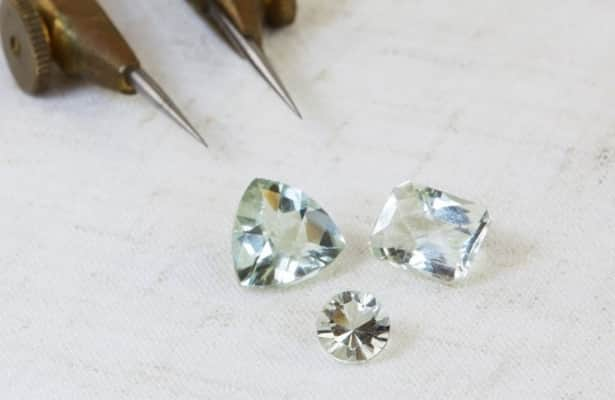
Favoured by the Victorians, Amethyst is most well known as a rich purple stone. We love the more unusual green amethyst, which is subtle in colour. A type of quartz, amethyst is a 7 on the Mohs scale, so needs gentle care.
Shop Amethyst Jewellery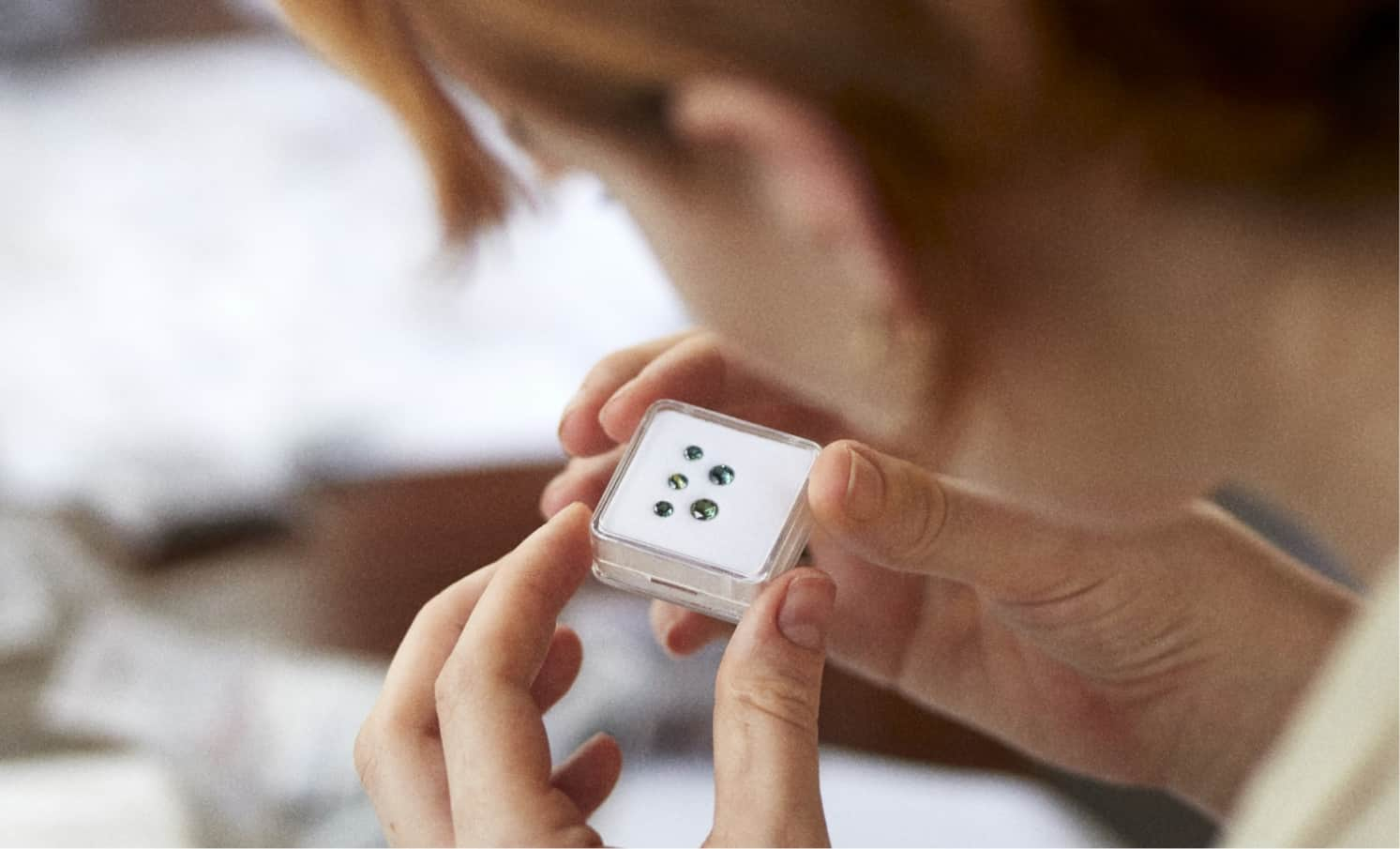
From humble seashells to rough emeralds, the beauty, colour and rarity of natural minerals have long enchanted humanity. Gemstones have been used in jewellery since Ancient Egyptian times, and have been discovered in archeological sites dating back 20,000 years.
Their vibrant colours have not only inspired ornamentation, but also the creation of myths and legends. For example, rubies were once believed to cure poison, and aquamarines were thought to calm the roughest of seas.

Favoured by the Victorians, Amethyst is most well known as a rich purple stone. We love the more unusual green amethyst, which is subtle in colour. A type of quartz, amethyst is a 7 on the Mohs scale, so needs gentle care.
Shop Amethyst Jewellery
Once believed to calm the oceans, Aquamarines are beloved for both their fresh, watery blue-green hue, and transparency. Aquamarines rate 7.5/8 on the Mohs scale, and with their subtle colour and a lustre that really sparkles, they are a popular alternative to diamonds in engagement and wedding jewellery.
Shop Aquamarine Jewellery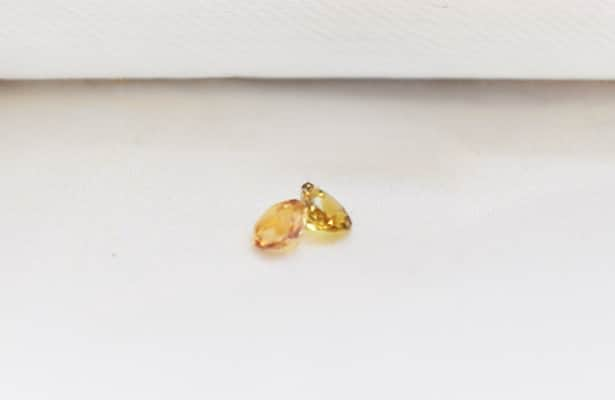
Citrine is a yellow variety of quartz, its warm colour a result of traces of iron when the gemstone is being formed, and its name taken from the French word for lemon.
Natural citrine is a pastel yellow and is fairly rare, so citrines with a more vivid, saturated colour will have more than likely undergone heat-treatment.
Although there is less history about Citrines than many other popular gemstones, there does seem to be a fascinating connection with Scotland! In Mediaeval times, Citrine was believed to heal bite wounds from Scotland’s only venomous snake, the adder. And by the 17th century, Scottish men had started using the gemstone as decorative pieces in the handles of their swords and daggers for luck.
Citrine measures 7 on the Mohs scale, so whilst relatively durable, it does require a certain amount of care.
Shop Citrine Jewellery
Prized for their vibrant colour rather than sparkle, humans have long been enchanted by Emeralds. The Emerald Cut was originally created to cut the raw stones in a way which would maximise the colour, but the elegance of this cut has meant that it has since been widely used for diamonds.
Emeralds measure 7.5 to 8 on the Mohs scale, which means they require a little more care than harder wearing stones.
The Emeralds used in our fine jewellery pieces are sourced with the help of independent artisanal traders such as Gemstones Brazil and Fairtrade Gems who work to assure the provenance of their stones, that responsible mining practices are in place that will not damage the environment, and that the extraction will be of benefit to local people.
Shop Emerald Jewellery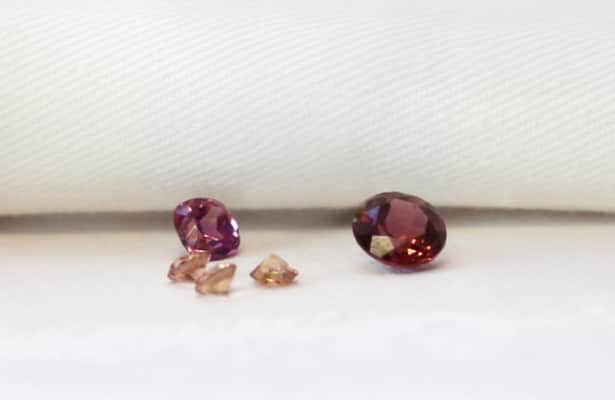
Garnet is a gemstone steeped in history, it has been found in the jewellery of many Egyptian burials and was the most popular gemstone of Ancient Rome, indeed, the word ‘Garnet’ originates from the Latin for ‘pomegranate seed’.
In London, Mudlarks find hundreds of red garnets along the exposed riverbed of the Thames at low tide every year - but no one really knows how they got there!
Deep red garnets are widely occuring and the most recognisable, but they come in a variety of rarer hues. Green garnets are known as Tsavorite, and Demantoid is an especially rare and sparkly green garnet, taking its name from the old German Demant, meaning diamond. Spessartine is an orange garnet, and Rhodolite is purple-red garnet. 6 - 7.5 on the Mohs scale
Shop Garnet Jewellery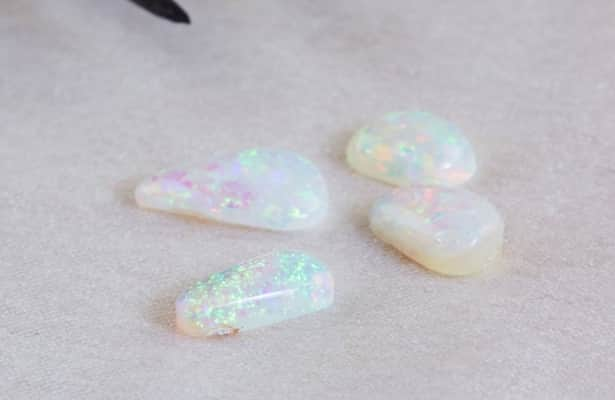
Opals are mainly found in Australia and Ethiopia, and are characterised by flashes of colour which appear from deep within the stone. This iridescent play of colour is caused by tiny spheres of amorphous silica, which naturally refract the light.
For our fine jewellery collection, we have been sourcing Opals from Ancients 17 who ethically source rough stone from Lightning Ridge, Australia and cut them in freeform shapes to celebrate the natural wonders of this magical gemstone.
Measuring 5.5 to 6 on the Mohs scale, Opals do require a little extra care as they will easily scratch, and can react to extreme temperature changes. As they are formed from water, they retain a water content - so need a certain amount of humidity to avoid fractures or crazing. Lightning Ridge opals have a low water content of only 2-4% so are much more durable, and the area is known for producing the best quality opals in the world - often considered rarer than Diamonds.
Shop Opal Jewellery
The only gemstone in the world formed by a living organism, pearls are considered to be the world’s oldest precious stones, and were first discovered by early humans searching for food along the seashore. Known and loved for their iridescent sheen, pearls measure just 2.5 on the Mohs scale.
For high quality cultured pearls, we work with Marc’Harit for one of a kind pieces. They source their pearls from farms in French Polynesia, the Philippines, Indonesia, and Mexico - who they regularly visit to ensure that the conditions under which the pearl production takes place comply with sustainable principles.
Shop Pearl Jewellery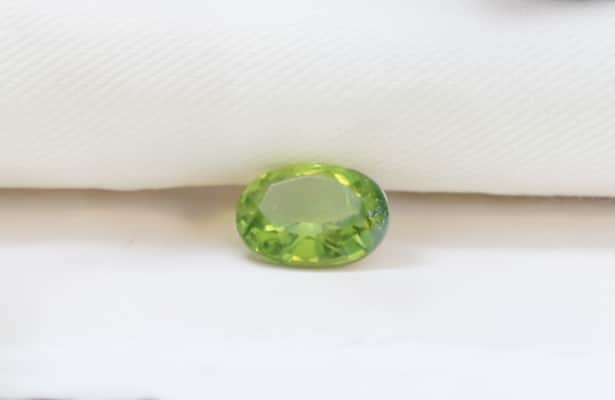
Peridot is the only gemstone that uniquely comes in one colour! Always green in a range of hues, but most commonly with yellow tones for a fresh pop of colour. Peridot was highly valued by the ancient Egyptians, who kept the location of its volcanic mines secret, and believed it to be the “gem of the sun,” which could keep nightmares at bay.
Fascinatingly, Peridot has been found at meteorite crash sites, meaning that the gemstone exists in space!
Peridot measures 6.5 to 7 on the Mohs scale, so whilst relatively durable, it does require a certain amount of care.
Shop Peridot Jewellery
Often considered one of the most precious gemstones in existence, and prized for their rich colour, rubies have been long favoured by royalty and were once believed to protect soldiers in battle. Ranging from a vibrant orangey-red to a more purple hue, they measure a resilient 9 on the Mohs scale, making them a practical choice for pieces worn every day.
Shop Ruby Jewellery
Sapphires are the second hardest mineral on Earth, making them a fantastically durable 9 on the Mohs scale. Although most commonly recognised in dark blue, sapphires come in a rainbow of hues from blues and greens through to yellow and orange, through to purple, pink and peach.
The sapphires in our Fine Jewellery are sourced by our long-term supplier Wennick-Lefévre, who use responsible mining techniques in Madagascar and Sri Lanka, alongside paying fairly for both stones and wages. Their positive impact is furthered by planting a tree for every stone sold, to help combat deforestation caused by irresponsible practices.
Unlike the majority of sapphires in the marketplace, Wennick-Lefévre stones do not undergo radiation or industrial treatments to intensify their hue. Each stone is pure, untreated, and therefore of the highest quality - with its unique and complex colour profile exactly as it was taken from the ground. With their experience in the business of precious gemstones combined with the knowledge of what this can often entail, one of their key beliefs is that “only a supply chain based on equality and respect can be called responsible.”
Shop Sapphire Jewellery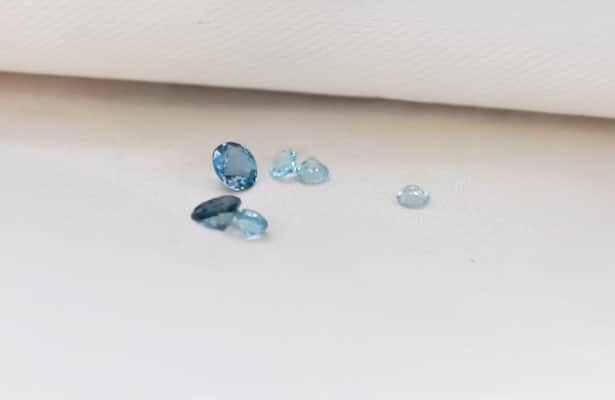
Topaz is found all over the world, and is naturally colourless, but trace elemental impurities present when it is being formed can mean that it can also be found in pale blue, or golden brown to yellow orange. Topaz will often be treated with heat or radiation to achieve vibrant shades of blue or pink.
We often use White Topaz as an affordable alternative to Diamond, and these two stones have a long standing connection, dating back to the 1700s when a huge gemstone mined in Brazil was thought to be the largest diamond in the world. It turned out to be a huge White Topaz. On the Mohs scale, Topaz measures an 8 so is a good option for everyday wear.
Shop Topaz Jewellery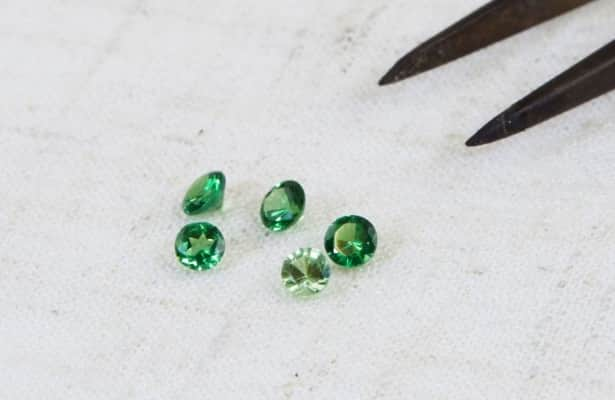
A rich and vibrant green garnet, often compared to an emerald in colour, but with perhaps a little more sparkle, Tsavorites are found in Kenya and Tanzania, and were formed in the earth before the time of the dinosaurs! Tsavorites measure 7 to 7.5 on the Mohs scale, so whilst relatively durable, do require a certain amount of care.
Shop Tsavorite Jewellery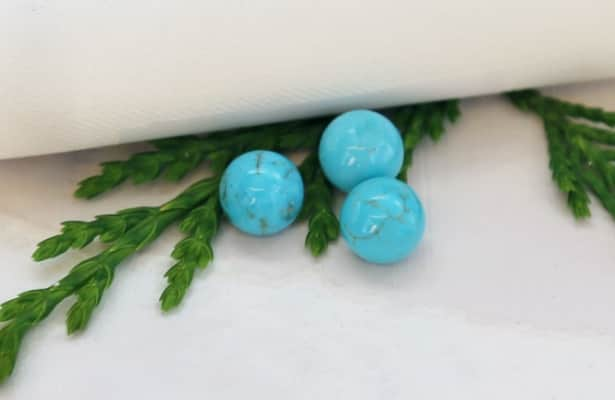
Turquoise forms where mineral-rich water seeps into rocky gaps, over time only the minerals remain - and Turquoise is formed. Its blue appearance is derived from copper, and the green tones come from iron.
Turquoise has been used for ornamentation by humans for thousands of years, and some experts think it was the first gemstone ever to be mined. With deep cultural roots in the indigenous communities across North America, it would also be used in healing practices, and formed into tokens of protection.
Turquoise measures 5 to 6 on the Mohs scale, so is a relatively soft stone.
Shop Turquoise Jewellery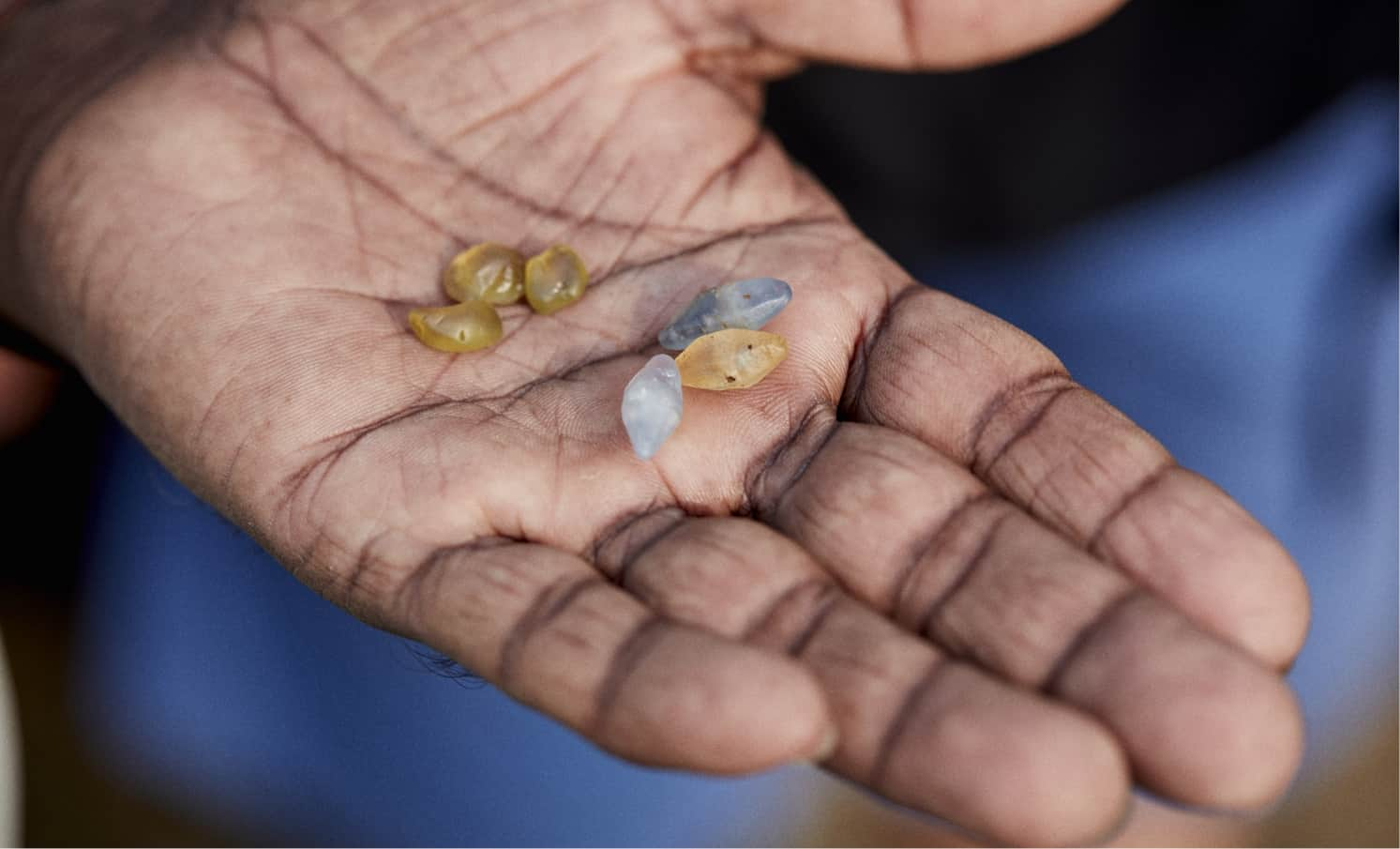
We make a conscious effort to ensure that any stones we purchase are responsibly sourced - but sadly, it may not always be possible to guarantee the provenance of all the stones we use, as certified or transparent supply chains are still not commonplace.
Alex and our Design team regularly visit the Ethical Gem Fair in London to source stones from a diverse range of small-scale, purpose-led gemstone suppliers who are committed to transparency & the support of artisanal miners around the world.Through this fair, we have formed relationships with suppliers such as Nineteen 48 and Moyo Gems - a collaboration founded in Tanzania to specifically support and empower female miners in the assurance of their gemstones from mine to market.
Stones sourced via these connections will be used in our One of Kind and Limited Edition pieces, and are also offered through our Bespoke Service.